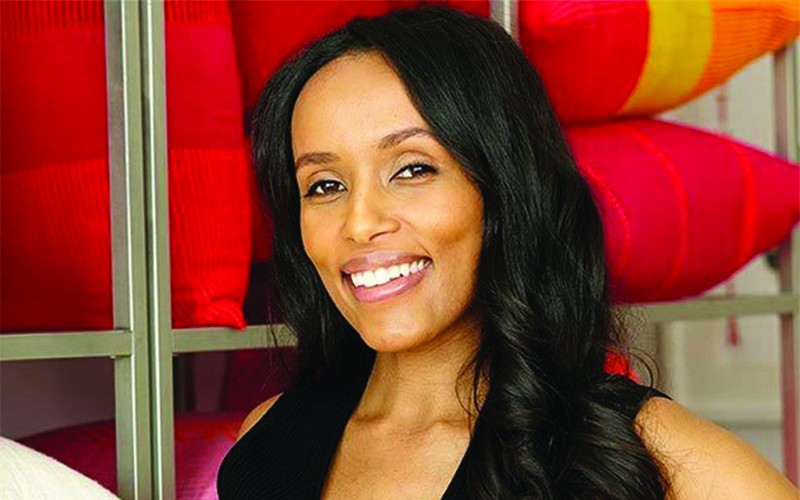Human-CENTERED - Hana Getachew '03

Hana Getachew launches her spring textile line
Working for another design company would never have been satisfying for Hana Getachew ’03, CEO of Bolé Road Textiles. So she started her own, giving it a name that pays homage to her roots.
“Bole Road is the route my family took on our way to the airport in Addis Ababa, Ethiopia, when I was three years old, on our way to Montreal – and eventually to New York,” explains Getachew, now a 36-year-old entrepreneur in Brooklyn.
“I didn’t return until my sophomore year at Cornell, 18 years later, and it was such life-impacting experience – going back there after so long. That return along Bole Road influenced my remaining years at Cornell and also my career.”
As she speaks, one eye is on a dire weather forecast and the other on her seven-month-old daughter who shares the home-studio and Bolé Road Textiles headquarters. The Carroll Street studio is a trek to Manhattan’s Pier 92, site of the annual Architectural Digest Design Show, where Getachew needs to preview her new collection. A Nor’easter blizzard named Stella is approaching the metro area.
Seemingly unfazed, the youngster chats cheerfully and so does Getachew, detailing the business plan for a company with the slogan, “Designed in Brooklyn, Handwoven in Ethiopia.”
“I design all my textiles, starting with a concept I’d like to explore. For example, the inspiration for designs in the new collection is the mountain scapes of Ethiopia. I was inspired by the mountain ranges and horizons and the landscape – all cues to create patterns and color palettes. Then I begin the sampling process with my Ethiopian artisans.”
Typical interior-design products for Bolé Road Textiles are pillows and rugs, table runners, and napkins. One specialty, Getachew’s comfy hooded bath towels, were scaled down when her daughter was born and became the inspiration for the Bolé Road Baby line. Skillfully complicit in the baby-oriented wares are the Ethiopian women Getachew does business with.
“Traditionally, Ethiopian weaving was men’s work, handed down from father to son through the generations, and they stil ldominate the weaving collectives,” she says. “Lately a few women run their own weaving studios – although all their weavers are men – and the women have computers and are set up for export. It’s easier to communicate with the businesswomen, but I enjoy working with both groups.”
The radio blares a further storm warning, now a state of emergency. Only the child seems blissfully unconcerned, and the entrepreneur from Ethiopia remembers winters in Ithaca.
“I started as a fine arts major in Architecture, Art and Planning,” Getachew recalls, “and somehow found my way into DEA and the interior design program there.
“Right away, I knew it was the perfect fit. The program let me focus on things I was interested in, creatively – the aesthetics and the art – with a strong foundation for design-thinking and problem-solving. The human-centered focus on design reallyappealed to me. Of course DEA had an analytical side, a sustainability side. But it was the human-centered approach todesign that I found incredibly intriguing.”
Getachew was aware of Textiles and Apparel (now Fiber Science & Apparel Design), a popular major among herclassmates, but says: “I had no idea textileswas going to be part of my future, so Ididn’t take classes there.Inretrospect, thatcould have been very helpful.”
Getachew started the business “to giveback and be more involved with my home country. I saw textiles as an avenue where I could do both – be in the world of designand share something from the Ethiopian culture.”
The young child’s optimistic burbling must have helped. The worst of Winter Storm Stella missed New York. Installedin time for the design show, the newcollection was a hit.